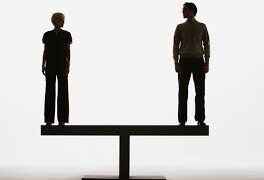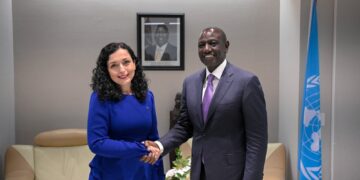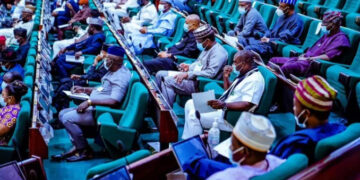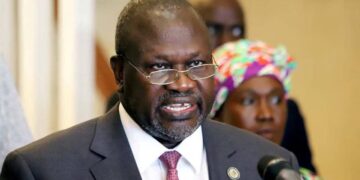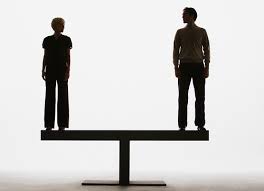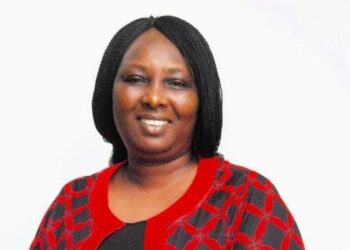Just as the Womens’ Day 2022 elapses with the month of March, a new public opinion poll conducted by NOIPolls has revealed that there is discrimination against women in Nigeria as stated by 82 percent of adult Nigerians.
Additionally, analysis by geographical locations indicates that the North-East zone had more respondents who made this assertion.
Similarly, there are more female (86 percent) than male, 78 percent respondents in this category. This is not particularly surprising given that women have continued to fight for the protection of their rights in Nigeria, ERE-EBI AGEDAH writes
Unfortunately, the Gender and Equal Opportunity Bill which seeks gender equality in the country recently suffered another setback at the National Assembly. On March 1st, 2022, despite extensive lobbying, sensitization, consultation, and advocacy, the 9th National Assembly joined previous ones to legislate over and legitimise the discrimination of women. The bill was to allow for the domestication and prohibition of all forms of discrimination against women, with the aim to create gender parity and end negative gender stereotypes.
It is remarkably worrisome that this happened on the first day of the International Women’s month, and on the Zero Discrimination Day when the world commemorates and celebrates the right of everyone to live a full and productive life, and live it with dignity, free from discrimination.
Subsequently, despite the rejection of this Bill by the 9th National Assembly, the poll further revealed that most adult Nigerians believe that women, if given the opportunity as men, will do well in academics (95 percent), economy (93 percent), science & technology (90 percent), innovation (89 percent) as well as political leadership (84 percent). With regards to challenges faced by women in Nigeria, the three top challenges singled out by adult Nigerians includes gender inequality (36 percent), gender-based violence, 35 percent and limited opportunity which affects women in the country.
Contrary to the rejection of the Gender and Equal Opportunity Bill by the 9th National Assembly, 30 percent of adult Nigerians nationwide advocated for the execution of women’s right, 25 percent suggested that gender discrimination should be banned while 13 percent recommended that the Gender Equality Bill should be sponsored again.
It is therefore imperative that the Ministry of Women affairs and Social Development, policy makers, civil society organizations and all relevant stakeholders synergize to address the issue raised in this survey to ultimately improve gender parity in the country. These are some of the key findings from the Gender Equality Poll conducted.
United Nations statistics show that 70 percent of the 1.3 billion people living in conditions of poverty are women. Also in urban areas, 40 percent of the poorest households are headed by women. Additionally, 50-80 percent of women predominate in food production but they own less than 10 percent of the land. Interestingly, 80 percent of the displaced by climate related disasters and changes around the world are women and girls.
Whether deliberate or unconscious, the bias makes it difficult for women to move ahead. Knowing that bias exists isn’t enough, action is needed to level the playing field. Until the necessary action is taken and all hands-on deck to fight the bias, gender inequality will continue to be a bane to sustainable progress in the world at large.
Additionally, 82 percent of the respondents who stated that there is gender inequality were further probed and 30 percent mentioned that the reason for gender inequality is due to limited chances of women in political leadership while 14 percent stated that women are not given the opportunity to be heard in the society, amongst other reasons.
On the other hand, out of the 18 percent who stated that there is gender equality, 28 percent stated that everybody is treated equally while 21 percent stated that there is no discrimination against both genders and 16 percent stated that there is nothing as gender inequality amongst others.
To find solution to the problem of gender inequality, respondents were asked for recommendation and the poll result revealed that 33 percent stated that they should mobilize community-based awareness programmes, 25 percent stated that they should encourage female participation in leadership positions and15 percent further mentioned that they should discourage gender-based violence amongst other suggestions.
Subsequently, the poll revealed that most adult Nigerians believe that women if given the opportunity as men will do well in academics, 95 percent, economy 93 percent, science & technology, 90 percent, innovation 89 percent and political leadership 84 percent.
Respondents were further asked to mention some of the challenges women face in the society and the poll result revealed gender inequality, 36 percent as the main challenge women in Nigeria. This is closely followed by respondents who mentioned gender-based violence, 35 percent while 32 percent believe that limited opportunity affects women in the society.
Respondents were asked about the role of men in achieving gender equality and the poll result revealed that 30 percent of the respondents advocated for the execution of women’s right. While 25 percent stated that gender discrimination should be banned, 13 percent recommended that gender equality bill be sponsored amongst other suggestions.
Finally, the poll revealed that 40 percent of the respondents are of the view that women should be encouraged to take on science related professions while 28 percent of the respondents suggested that incentives should be given to women as a form of encouraging them to take on science related disciplines. Also, 23 percent advocated for the sponsorship of the girl child as a way of encouraging to take on science related professions.
Having gauged the perception of Nigerians on gender equality, it is evident as revealed by this study that there is a huge gender disparity in Nigeria. This was further worsened by the rejection of the Gender Equality Bill by 9th National Assembly on the 1st of March 2022, same month when the global community celebrate women.
Survey Methods
The opinion poll was conducted through telephone interviews of a proportionate nationwide sample of 1,000 randomly selected phone-owning Nigerians aged 18 years and above, representing the six geopolitical regions and 36 states and the FCT of the country. Interviews were conducted in 5 languages – Igbo, Hausa, Yoruba, Pidgin English, and English. Although we can say with 95% confidence that the results obtained were statistically precise – within a margin of error of plus or minus 4.65%; we recognize that the exclusive use of telephone polling has its limitation of excluding non-phone-owning Nigerians. Nonetheless, with the country’s tele density put over 100 percent by the Nigerian Communications Commission, NCC, we consider our telephone polling approach appropriate. Also, given the rigorous scientific process of randomization and stratification applied, we can confidently stand by the validity of our methodology and approach.
With the assurance that the legislators will revisit the 5 rejected Bills, which include Bills seeking to reserve special seats for women at the National and State Houses of Assembly, provide for affirmative action for women in political party administration, and grant citizenship to foreign-born husbands of a Nigerian woman, there appears to be light at the end of the tunnel. It is on the strength of this assurance that women groups who staged week-long protests at the National Assembly gate called for suspension. However, it may be too hasty to share any optimism as Nigerian leaders over time have not demonstrated fidelity with their promises. If this ends up being observed in the breach, it means that several years of advocacy for women to be given a voice in the country’s decision-making table would have gone effort in futility.
